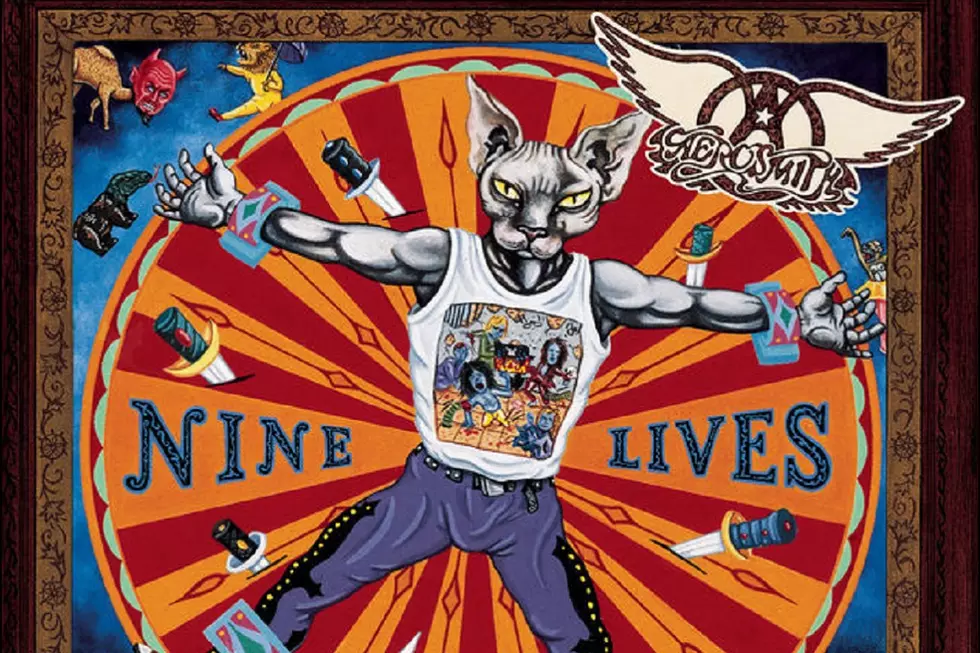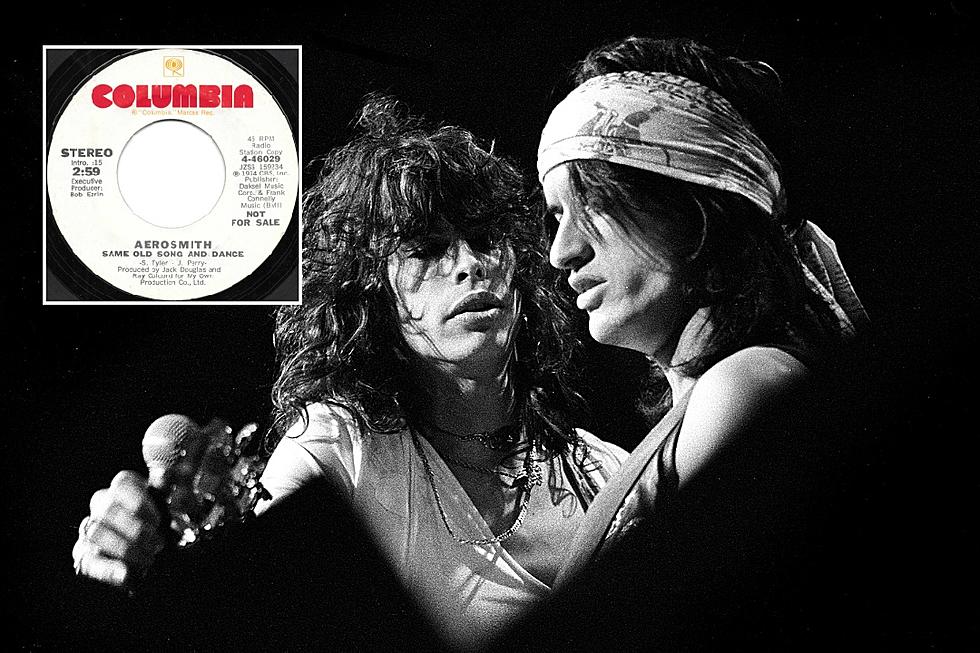
How Aerosmith Capped a Tumultuous Period With ‘Nine Lives’
After Aerosmith recorded the song “Nine Lives,” the band decided also to use the phrase as the title of its new album. It was an expression not only of the ups and downs, the second and third chances that the Boston rockers had experienced in their then-25-year career. It also signified the arduous process that it took to complete their latest studio record.
By the mid-’90s, Aerosmith were deep into a mid-career comeback that had begun with 1987’s Permanent Vacation and continued with Pump and Get a Grip, earning the band multi-platinum sales and an armload of U.S. Top 40 hits (11 between the trio of albums). As the boys began to plan their next studio release, frontman Steven Tyler and guitarist Joe Perry decided to work with Glen Ballard – the songwriter-producer who was just coming off a blockbuster success of his own, Alanis Morissette’s Jagged Little Pill.
The “Toxic Twins” and Ballard teamed up in 1996 in Miami, beginning to write songs such as “Falling in Love (Is Hard on the Knees),” “Taste of India” and “Pink” (the last one with Richie Supa). Perry and Tyler also wrote with previous collaborators Desmond Child and Mark Hudson, while starting a new partnership with Marti Frederiksen.
Just after the rest of Aerosmith – guitarist Brad Whitford, bassist Tom Hamilton and drummer Joey Kramer – came down to start rehearsing the new material, something unexpected happened. Kramer started to feel ill.
“It was a big, blue funk,” Kramer said in an MTV documentary about Nine Lives. “I went into a deep depression. A lot of issues came up for me that I had to deal with on my own. A lot of stuff around my childhood, I had lost my dad a little while back. It was sort of an emergency that came up for me and I had to take care of myself. That was the most important thing at the time.”
Listen to Aerosmith Perform 'Nine Lives'
Joey Kramer was soon on a plane back home, while the other four-fifths of Aerosmith decided how to proceed. They elected to bring on session drummer (and member of Tom Petty and the Heartbreakers) Steve Ferrone to record with the band. The idea was that, if Kramer felt better, he could come back and record his parts in place of Ferrone’s.
The plan didn’t work out too well. Columbia Records, which was to release its first Aerosmith album since 1982, wasn’t pleased with the early tracks, feeling that Ballard had overproduced the Miami sessions, robbing the band of its grit. Tyler and pals weren’t thrilled with the results either, both because of Ballard’s work and Kramer’s absence.
“We worked with another drummer for a while,” Tyler said, “and it just didn’t have the Aerosmith kick-ass ability. So we took the whole process up to New York.”
It wasn’t quite that simple. Columbia, expecting a summer ’96 release, allowed Aerosmith more time to get it right. In the meantime, the band parted ways with its manager Tim Collins. After he saw the group through the most lucrative period of its career, Collins was fired because the band members felt he was playing them off each other. Aerosmith also sacked Ballard, choosing to work with Kevin Shirley. The South African engineer/producer was nicknamed “The Caveman” for his basic approach. It was complete turnaround from Ballard’s meticulousness.
Aerosmith got some happy news when readying to record in New York: Kramer was feeling well enough to join his bandmates in the studio. First, he attempted to replace Ferrone’s performances on the existing tracks. When that didn’t sound right, Aerosmith elected to start all over, playing the Miami material together as a five-piece. Well, sometimes it was more than a quintet, with the band joined on certain songs by strings players, keyboardist John Webster and Indian musician Ramesh Mishra, who played the sarangi on “Taste of India.”
Watch Aerosmith Perform 'Pink'
Nine Lives was “different in the sense that we hit upon a couple of East Indian vibe type-things that Yma Sumac and Donovan were into and the [Rolling] Stones and the Beatles,” Tyler said on Charlie Rose. “And it was something we’d never done together. … One of the things about Aerosmith that is a feather in our cap as far as longevity goes is that we’ve been able to be so different. Go from a song like ‘Nine Lives’ into a song like ‘Pink.’ Completely different.”
“Pink,” with its harmonica-spiked, bluesy feel, would end up becoming the album’s biggest hit – both on radio and MTV, where its computer graphics-enhanced video earned heavy rotation. Though the horn-driven lead single “Falling in Love” and power ballad “Hole in My Soul” also made the charts.
Nine Lives made its debut on March 18, 1997, and found itself atop the Billboard chart the next month. But despite being a No. 1 album, a worldwide hit with a number of singles on the radio, the album seemed like a disappointment. Such were the heights of “Angel,” “Janie’s Got a Gun” and “Cryin’” that anything less than record-setting sales appeared to be a disappointment.
“But that’s what we go through,” Whitford told Songfacts in 2015. “You create this music and you always have high hopes for it and it doesn’t always work out that way.”
Not that Aerosmith had much to worry about. The band soon embarked on a massive tour, netted a Grammy for “Pink” and remained relevant to MTV in middle age. The following year, the band would score its first (and only) No. 1 single with “I Don’t Want to Miss a Thing.”
Albums That Saved a Band's Career
Was Aerosmith’s ‘Night in the Ruts’ Doomed to Fail?
More From Ultimate Classic Rock









